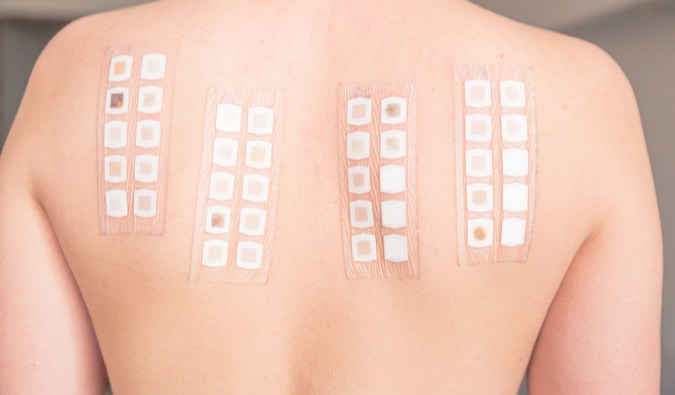Have you experienced signs of an allergic reaction, but are not sure what exactly has caused your symptoms? If so, patch testing is one way to determine your skin allergies. This quick and easy test is painless and helps to determine possible allergens. Once your allergens are determined, our team will help to create an individualized treatment plan to help combat allergic reactions.
What is Patch Testing?
Patch testing is done to determine if a certain substance is causing allergic skin inflammation or an allergic reaction. There are more than 200 known allergens that are often found in our daily lives. These include certain rubber products, textile dyes, metals such as nickel, preservatives, glues, medicinal creams or lotions, soaps, cosmetics, and more. This test is done to help your dermatologist identify and develop a treatment for your allergy.
In some cases, a few different skin conditions may be confused with allergic contact dermatitis. These include eczema and hives. An appointment with one of our dermatology specialists can help to determine if you are experiencing an allergic reaction or a skin condition.
Who is a Good Candidate for Patch Testing?
While patch testing is safe for adults and children, it is not recommended in certain circumstances. If you have ever had a severe allergic reaction (anaphylaxis), have certain skin conditions that affect large areas of your skin, or take certain medications that may interfere with results, you may not be a good candidate for patch testing. Please schedule a consultation appointment with your dermatologist to determine if patch testing is right for you.
What to Expect During Patch Testing?
During patch testing, patches containing different extracts of substances that may cause a contact allergy are placed on the skin. Patients will have the patches taped on their back for 48 hours. During this time, bathing and heavy sweating should be avoided. Be sure to keep the patches in their original positions, as the test results will be inconclusive otherwise. The patches are then removed on a return visit to our office. Skin irritation at the patch site may indicate that you are allergic to that specific substance.
Patch Testing FAQs
Can I get a patch test wet?
Can patch testing make you feel sick?
Can you take antihistamines during patch testing?
Can you wear a bra during patch testing?
How do I prepare for an allergy patch test?
Patch Testing Recovery
There is no downtime required following patch testing, though redness and itchiness from the test sites may persist for a while after your test. If this occurs, topical steroids may be prescribed to help ease these symptoms.
Testing may take several days to produce results. Your dermatologist will work with you to treat your allergies by creating an individualized treatment plan, which may include medications or changes to your diet or home environment. Our main goal is to help you avoid allergic reactions for a comfortable daily routine.
Schedule a Consultation
If you are experiencing allergic skin inflammation and are interested in determining what the cause of your reaction is, patch testing is a great choice. Contact our office today to schedule your consultation appointment with one of our dermatologists.

Get Started With A Visit!
Fill out the form below and we will reach out to you shortly to schedule an appointment.